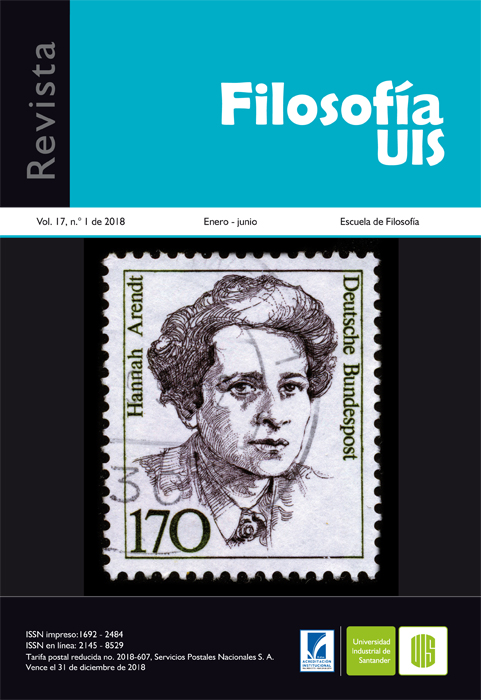Sortal Predicates and Cardinality in Quantum Context
Published 2018-05-16
Keywords
- cardinal,
- identity,
- indistinguishability,
- sortal,
- individuality
How to Cite
Copyright (c) 2018 Revista Filosofía UIS

This work is licensed under a Creative Commons Attribution 4.0 International License.
Abstract
Based on the indistinguishability of the identical particles in the quantum statistics, French and Krause have proposed the existence of a new class of predicates: the ‘Quantum sortal’. The peculiar behavior of such predicates is that, besides establishing criterion of application, they assign a criterion of (quasi) cardinality that does not require the individuality of the items that fall on their extension. Such non-individual items are called m-atoms and their lack of individuality formally results in syntactic rule: ‘x = x’ is not a well-formed formula (being x a variable for m-atoms). The obvious problem with the posing of French and Krause is that the usual definition of cardinal presupposes the notion of identity, so to talk about how many non-individuals are in the extension of a quantum sortal is necessary to develop a notion of cardinality different from that used in the classical sets theory and perhaps common sense. In this paper, I will try to argue that this task faces two problems: 1) that the proposals that deviate from the classical notion of cardinal do not allow to answer the question ‘How many?’ in any intelligible sense; and 2) even if the above is not a problem (because in quantum contexts people often say things that nobody understands with quite impunity) cardinal definitions applicable to sortal do not achieve become independent of the identity. From the above, I suggest, in conclusion, that the peculiarity of quantum sortal is due to the primitive individuality of quantum objects.
Downloads
References
Arenhart, J. and Krause, D. (2014a). Why non-individuality?A discussion on individuality, identity, and cardinality in the quantum context. Erkenntnis, 79, 1-18.
Arenhart, J. and Krause, D. (2014b). From primitive identity to the non-individuality of quantum objects. Studies in History and Philosophy of Modern Physics, 46, 273-282.
Arenhart, J. and Krause, D. (2016). Individuality, quantum physics, and a metaphysics of non-individuals. The role of the formal. En Guay, A. y Pradeu, T. (Eds.), Individuals Across the Sciences. Oxford: Oxford University Press.
Domenech, G. y Holik, F. (2007). A discussion on particle number and quantum indistinguishability. Foundations of Physics, 37(6), 855-878.
Dorato, M. y Morganti, M. (2013). Grades of individuality. A pluralistic view of identity in quantum mechanics and in the sciences. Philosophical Studies, 163, 591-610.
French, S. y Redhead, M. (1988). Quantum mechanics and the identity of the indiscernibles. British Journal for the Philosophy of Science, (39), 233-246.
French, S. (1989). Identity and individuality in classical and quantum physics. Australasian Journal of Philosophy, (67), 432-446.
French, S. y Krause, D. (2006). Identity in physics. A historical, philosophical and formal analysis. Oxford: Oxford University Press.
French, S. y Krause, D. (2007). Quantum sortal predicates. Synthese, (154), 417-430.
French, S. y Krause, D. (2009). Remarks on the theory of quasi-set. Studia Logica, (99), 1-24.
Hawley, K. (2006). Weak discernibility. Analysis, 66(4), 300-303.
Jantzen, B. (2011). No two entities without identity. Synthese, (181), 433-450.
Ketland. (2006). Structuralism and the identity of indiscernibles. Analysis, (66), 303-315.
Krause, D. (1992). On a quasi-set theory. Notre Dame Journal of Formal Logic, (33), 402-411.
Lewis, D. (1986). On the plurality of worlds. Oxford: Basil Blackwell.
Lombardi, O. y Castagnino, M. (2008). A modal-Hamiltonian interpretation of quantum mechanics. Studies in History and Philosophy of Science Part B, 39(2), 380-443.
Morganti, M. (2011). Identity in physics: statistics and the (non-) individuality of quantum particles. En De Regt, H. W.; Hartmann, S. y Okasha, S. (Eds.), EPSA Philosophy of Scienc. Amsterdam, Springer, Berlin: Springer.
Pérez Otero, M. (1999). Conceptos Modales e Identidad. Barcelona: Edicions Universitat de Barcelona.
Saunders, S. (2003). Physics and Leibniz’s principles. En Brading, K. y Castellani, E. (Eds), Symmetries in Physics: New Reflections. Cambridge: Cambridge University Press.
Saunders, S. (2006). Are quantum particles objects? Analysis, (66), 52-63.
